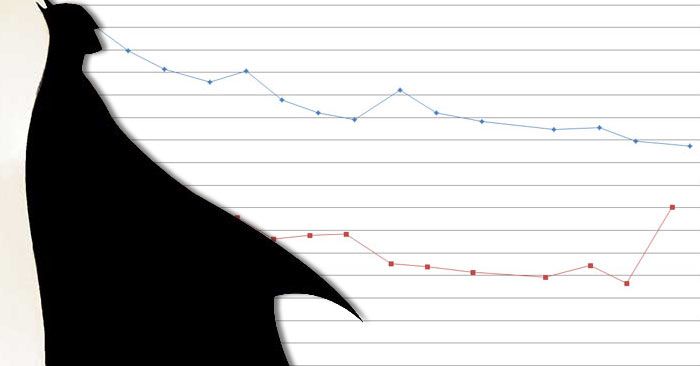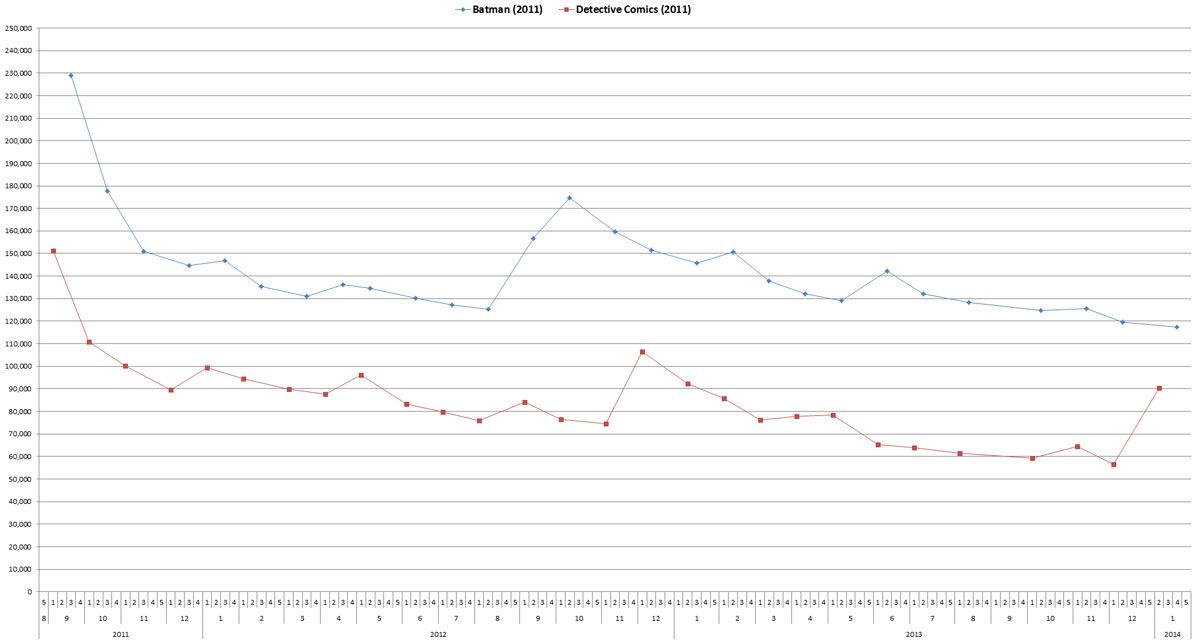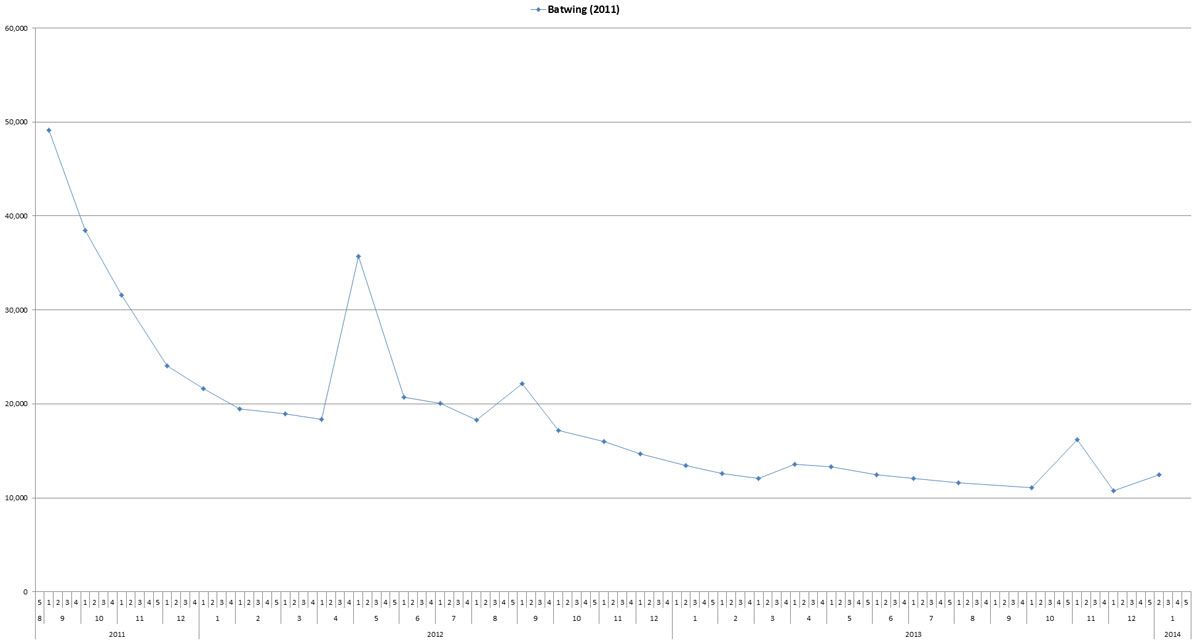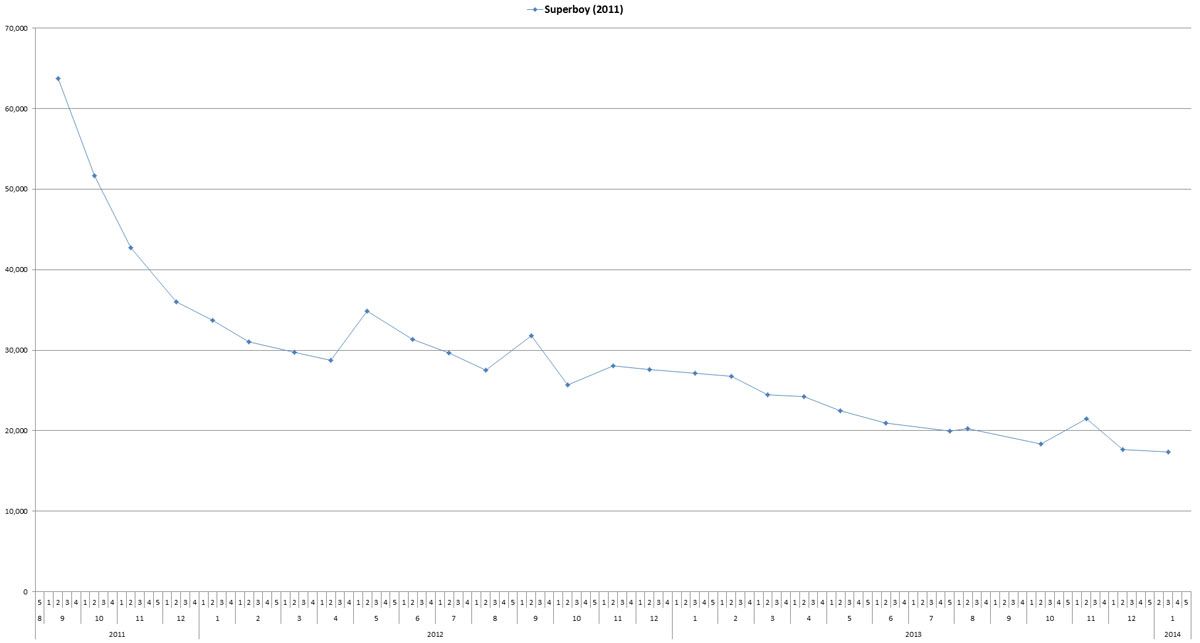Marvel had the largest percentage of the unit sales for the top 300 in January 2014 with 41.05% of the total units for the top 300. DC was a little ways away with 33.05% of the unit sales. Marvel had a total of 2,534,370 estimated units on the top 300 comics chart while DC had approximately 2,040,811 units. Both of those unit totals are below average for the publishers over the final order era (which started in March 2003) and below the 2013 average for each publisher. But January has the lowest average sales so starting the year out with below average sales isn't unusual.
"Batman" #27 was the best-selling comic of January 2014 with an estimated 115,492 units with another 1,903 down at rank 381 for the Print/digital combo edition which was the only comics to sell over 100,000 units. The second best-selling comic was "Detective Comics" #27, the extra-long anniversary issue celebrating the 75th anniversary of Batman which sold around 88,702 units with another 1,633 down at rank 393 for the Print/digital combo edition.
The $7.99 price tag for "Detective Comics" #27 made it the clear winner in terms of total retail dollars. The combined total of $1,193,718.70 between the two issues is more than even the largest of the publishers in the back half of Previews usually do in a given month. For that matter, the total of 207,730 estimated units is more units than even the largest of the publishers in the back half of Previews are often able to move in a single month. DC and Marvel are operating at a different level than the smaller publishers. Not better or worse, just different.
The smaller publishers can operate within the niches that aren't cost effective for DC and Marvel to target. The top selling Marvel comics was "Avengers World" #1 with approximately 86,727 units. Marvel essentially drops off the list below rank 150 with "Wolverine (MAX)" #15 which sold around 13,368 units. "Avengers AI" #8 sold an estimated 20,084 units and was lowest selling Marvel title on the list not announced as ending. Don't be surprised if it ends shortly after dropping below 20,000 units.
Either DC is able to operate a bit more efficiently or can afford to make less money per issue since titles seem to be able to survive for a while below the 20,000 unit mark. Surprisingly, "The Movement" #8 sold around 6,629 units yet the title is still being solicited as of the solicitations for comics shipping in April. A Marvel title with those sales most likely would have ended after the first story arc. If the title was likely to sell great in trade or digitally, then it makes sense to keep the title around. With "All New X-Men" v1 trade paperback selling around 3,540 units as the top selling new trade during January (beaten out by reorder activity of the first trade paperback volumes of "Saga" and "The Walking Dead"), it is hard to image "The Movement" doing stellar sales in trade. Perhaps the digital sales are unusually robust -- but don't be surprised if the words "Final Issue" appear in upcoming solicitations for "The Movement" or "Stormwatch," "Batwing" or "Larfleeze" for that matter.
The recent retooling of "Superboy" should buy that title a little time before being cancelled. The nature of the retooling and the creative team now on the title don't matter, however; DC failed to promote the retooling, much like they failed to promote the change in "Batwing" when the new creative team replaced the title character.
Based on those charts, can you tell when the new characters and creative teams started? Maybe a big promotional push would not have made a significant difference. Back in February 2013, instead of promoting the change in "Batwing," DC tried to promote ever title to some degree with the gatefold "WTF" covers around this time last year including what would have been "Batman" #900 if not for the New 52 reboot. In October 2013, instead of promoting the change in "Superboy," DC promoted the first issues of "Harley Quinn and "Justice League 3000." Those were not inherently bad decisions. But those decisions seriously limited the sales potential of the two titles at key points when promotion might have helped them.
Given the number of titles DC and Marvel each publish, they have to pick and choose which titles to promote each month. It makes more sense to promote titles with higher potential sales than struggling titles. The problem with is those lower selling titles need to boost in sales in order to survive. If someone doesn't knows Marv Wolfman has taken over "Superboy" and replaced the character with a new version then they aren't likely to either try out the title.
A number of long lasting titles from the small publishers are able to survive and in some cases thrive at these lower sales levels. "Atomic Robo: Savage Sword of Dr. Dinosaur" #5 from Red 5 Comics ended with around 3,248 units at rank 351. "Atomic Robo" has been published as a series of miniseries since 2007. No doubt another "Atomic Robo" miniseries will be solicited soon. Sometimes it falls below the radar of the top 300 comics but it is profitable enough for them to continue on with.
At rank 353 is "Sixth Gun" #37 from Oni Press with an estimated 3,211 units. The title started in 2010 making it one of the longer lasting titles on the list. It isn't a title DC or Marvel could probably justify publishing from a profit perspective yet Oni Press is able to have success with it for years. Smaller publishers aren't answerable to corporate accountants and can take some creative risks that may not be possible or practical at Marvel and DC.
Titles like "S.H.O.O.T. First" from Dark Horse and "Protocol Orphans" from Boom Studios might at the bottom of the sales charts but they are still great titles. Most stores probably either didn't carry them or ordered enough for pull lists and requests meaning those titles weren't on the rack to be found by prospective new readers. Sure, I'd like to be able to wander into a local comic book store and find everything published there for me to check out before buying. Realistically, that isn't going to happen and some great material is selling lower numbers because of it. If you aren't finding enough great things to read at Marvel and DC, and depending on your tastes you might be finding a lot or very little, then look at the other premiere publishers and check out the back half of Previews.
As always, if you have any questions or comments, please feel free to email me at John.Mayo@ComicBookResources.com.




